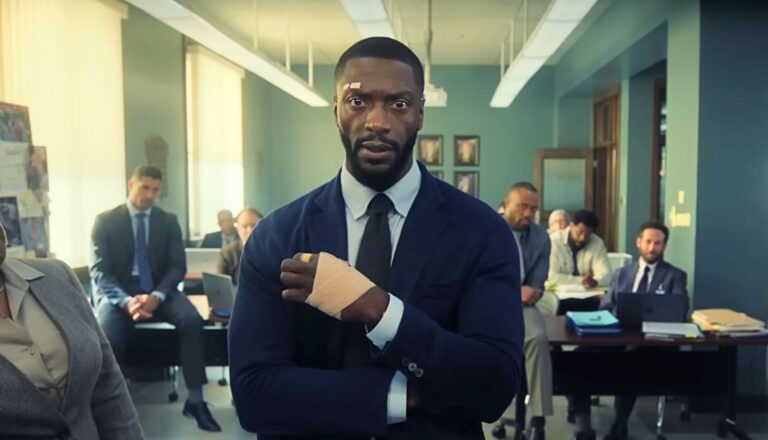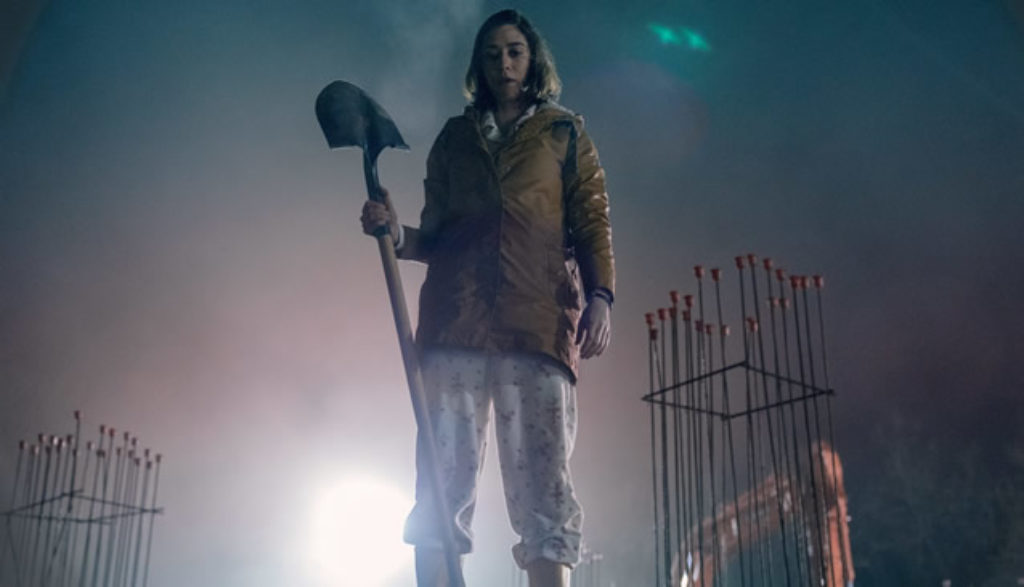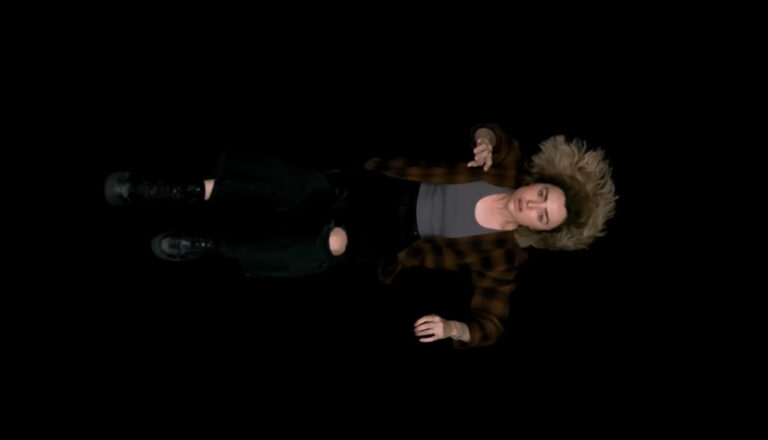
Cross
Though it’s compelling, the content concerns in Prime Video’s ‘Cross’ might be enough to cross it off your watch list.

Castle Rock’s been home to rabid dogs and serial killers, haunted cameras and devil-owned antique shops. Sure, it looks nice and all. But trust me: You wouldn’t want to live there.
Hulu’s look at Maine’s most infamous town (which, by the way, is adjacent to another rather well-known enclave called Jerusalem’s Lot) proves that season after season. And while it might be all too simple to die here, staying dead … well, that can be tricky.
The first season focused on a mysterious resident of Shawshank Prison and a young lawyer named Henry Deaver called back to defend him. In 2019, Castle Rock unveils a new season-long story—this one focusing on young vagabond Annie Wilkes and her daughter, Joy. We also meet angry local Ace Merrill, who’s not happy about a new mall being built that’s intended to serve the needs of the town’s immigrant Somali residents. Oh, and it’s being constructed on land reputed to be cursed.
While the town of Castle Rock boasts no drawbridges or portcullises or stone ramparts—typical features of most castles—there’s no question that a very important King holds sway here.
Even though his literary output has slowed in recent years, horror maestro Stephen King has had quite a run onscreen recently. IT scared up big money at the box office in 2017, and the sequel drummed up more than $200 million, too. That film shared theater space with Pet Sematary, based on another King novel. A movie based on Doctor Sleep, King’s sequel to The Shining, closes the author’s movie-laden 2019. Stranger Things, an original Netflix series with a serious Kingsian vibe to it, has become a bona fide cultural phenomenon. And Hulu is already home to some of King’s work, given that the network brought his novel 11.22.63 to the small screen in 2016.
Castle Rock, of course, isn’t based on a previous King work, but his DNA is spattered all over the series like blood. He helped create the thing with one-time Lost showrunner J.J. Abrams. And the town of Castle Rock has been the setting for many a King novel, from The Dead Zone and The Dark Half to Cujo and Needful Things. (And because King enjoys working in a shared universe, the fictional town is mentioned in dozens of his other works, too.) From the very beginning, we know just whose show this is.
Castle Rock tips its cap to dozens of King properties, it seems (along with a nod or two to Abrams’ own horror-tinged mystery, Lost). Some are overt: Annie Wilkes is a main character in the novel Misery; Ace Merrill showed up in The Body (called Stand by Me when it became a movie) and Needful Things.
Other Kingsian allusions are more subtle: Ace, for instance, mentions he’s been to the town of Derry before, the locale for the events from IT. And a local Realtor mentions a guy named Hubie Marsten, who just happened to murder his wife before the events of Salem’s Lot. Sure, King might not have penned Castle Rock (Sam Shaw and Dusty Thomason are credited as its writers), but like the secret twin of King’s The Dark Half, Castle Rock is wholly embedded in King’s universe, leaching from it its sinister undertones, its complex character studies and … its problems.
While King knows how to tell a ripping good yarn (and can be surprisingly, even positively, spiritual at times), he’s never been lauded for his restraint. His books are often filled with sex and language and oh-so-much gore.
Castle Rock stays true to its creator’s oeuvre. While a good chunk of the show is just atmospherically creepy, it sometimes revels in cascades of blood and regales viewers with gore. Death and murder are such common fixtures here that the Grim Reaper should get a credit in the cast list.
But even if you close your eyes throughout, you still gotta deal with what seeps into your ears. F- and s-words crash the party with regularity, as do a smattering of other swear words. Also like King, Castle Rock dabbles in the world of Christian faith, and that world is not always presented positively.
Yes, Castle Rock is quite a town. Unforgettable, you might say—even if you wish you could. But for discerning viewers with an eye out for objectionable content, not only is Castle Rock a place you wouldn’t want to live in, but you wouldn’t want to visit it, either.
Annie Wilkes and her daughter, Joy, literally crash into Castle Rock for a spell, flipping their car over as they drive through. The pair don’t stay anywhere for very long, and Annie’s not planning on sticking around here, either. She hopes to get a job as a nurse, steal several bottles of antipsychotics (for her own worrisome condition) and take off as soon as she can. Meanwhile, Ace Merrill fumes at the new Somali mall being built: His own shoddy warehouse holds several Somali businesspeople and their stalls, and that new mall is going to cost him business.
Someone kills a man with an ice cream scooper. Yes, that’s right: In one of the most disturbing deaths I’ve seen on television, the killer jams the scooper into the man’s mouth, then hammers it bloodily into the back of his throat like a spike, eventually suffocating the victim with the scooper. Annie, we learn, killed someone in the distant past. In flashback, she runs to a rushing river in a bloodstained shirt and, later, she hallucinates that a dead man with a bloody face (presumably her victim) is chasing her.
A guy firebombs a Somali-owned home, requiring fast work to extinguish the blaze by the occupant. A pit opens up in a construction area, leaving someone hanging precariously from a ledge. A character is apparently dying of cancer. We hear rumor of “massacres” and “kids vanishing into thin air” in nearby communities. Guns are brandished. A car crashes, and later we see one of the occupants with a small cast around her arm.
A girl writes and sings a song that she says is about witches—as in the Satan-worshiping witches that lived in the region long ago. (She tells Joy that those witches could be “buried right under our feet.) We hear derogatory references to Somali “prayer rooms” on talk radio, presumably denigrating Islam.
A local hospital serves both Castle Rock and the nearby community of Jerusalem’s Lot. But while Salem’s Lot patients run the gamut, we learn that 70 to 80% of those from Castle Rock are overdose cases. (The hospital’s drugs are kept securely locked because of that.) Annie steals drugs repeatedly in flashback, and schemes to do so again in Castle Rock. A cancer-ridden man smokes a pipe that, it’s insinuated, is infused with medical marijuana.
Characters say the f-word more than 20 times and the s-word another dozen or so. We also hear “a–,” “d–n,” “h—” and “d–k.” Jesus’ name is abused once.
In the Season One finale, The Kid attempts to lure Henry into the woods, believing that “the sound” is actually a portal to another dimension, one that he calls his “home.” When Henry refuses, The Kid takes on a new evil shade, turning to Molly (Henry’s psychic childhood friend) for help, but not before things in Castle Rock go quickly south. Henry’s flashbacks increase and he finally remembers who killed his father. At the end of the episode, a young woman is introduced as the possible new focus for the second season.
The Kid foretells the deaths of many. People are brutally stabbed, shot and killed in other ways. (A man is seen with an axe in his head and a woman is run over by a bus.) Dead bodies lie on the ground, covered in blood. Characters hear death threats and uncover , mysterious murders, and a woman contemplates suicide. Buildings explode and are consumed by fire. A man crashes his car after it’s attacked by ravens.
There is a brooding sense of fear over Castle Rock as omens take various forms. Henry remembers his father quoting Romans 6:23 (“For the wages of sin is death…”) and plotting to kill his unfaithful mother. We hear other discussions about sin, heaven, the voice of God and the desire to live a pure life.
People smoke cigarettes. An empty wine glass sits on a table. Jesus’ name is misused once. The f-word is heard more than ten times and the s-word three times. Other profanities include “b–ch,” “a–hole” and “h—.” There are multiple crude references to the male anatomy. Women wear revealing outfits.
After the warden of Shawshank Prison kills himself, his successor decides to open up a long-closed cellblock and finds, much to her consternation, a man caged up in its dank bowels. Fearing a public relations nightmare, she wants the guy (who’s not a prisoner) to simply disappear in the system. But a conscientious security guard calls Henry Deaver, a death-row attorney in Texas, to help the man. Henry, however, has his own dark history with Castle Rock, one that he’ll be forced to face.
The warden’s suicide by a hanging of sorts (in his car) is brutally depicted in a way that manages to decapitate him. We don’t actually see the rope pull off his head, but blood sprays across the dashboard of his car, and it’s pretty clear what’s happened. Later we hear that he was, in fact, decapitated. (One prison official jokes that the deceased warden should receive “10% off” his funeral costs).
A woman dies—badly—via lethal injection, jerking around when the drug fails to work as designed. Several prison guards are shown, through black-and-white security cameras, dead in the prison’s halls, blood pooling around their bodies. A mouse dies in a trap. A police officer uncovers a dead deer, wiping snow off its open eyeball. A live chicken is held over a hungry alligator, with the chicken thrashing and cawing in panic. Jokes and references are made to suicide, murder and death.
It’s suggested that the old, dead warden was a “perv,” and that the mysterious man was his sex slave (using a more obscene descriptor). When a man takes a shower, we see the upper part of his torso and a bit of his rear. A middle-aged woman buys drugs from a high schooler: He’s attracted to her, seemingly, but she tells him that she’d have to have kids in order to qualify as a “MILF.”
Someone pours himself a glass of whiskey. A woman fondly remembers how, as a kid, her dad would get drunk and drive his children to watch alligators. “Sometimes, I’d get to drive the car home at the end of the night,” she remembers. A coffee can is filled with cigarette butts, and we see a man smoke a cigarette. We hear mention of alcoholics and drug dealers, along with allusions to possible racism, too.
A woman ponders what happens to memories when we die. “Wherever you go next, does the tape get erased?” (She admits she actually hopes it does.) A street preacher blares a message over the radio. Henry visits his father’s old church, walking past its stained glass windows, and mentions to someone that his dad used to lead Bible studies at the prison on occasion. Crosses hang on walls. We hear references to heaven and Ecclesiastes.
We hear about a dozen f-words and at least six s-words, along with “d–n” and one abuse of Jesus’ name.
Henry’s son, Wendell, comes into town. Henry attempts to retrace his childhood memories to understand the “ringing sound” that haunts him. Ruth returns from the hospital after attempted suicide. Henry’s client, “the Kid,” warns Pangborn that Ruth may not have much time left to live.
Molly Strand tells Henry, to his disbelief, that he hated his father as a young child and wanted him to die. Additionally Molly tells Henry that she and he are “one and the same,” and that she also wanted Henry’s father to die.
Henry and his son have a broken relationship that, to this point, Henry seems unable to mend.
A group of men talk about hearing “the voice of God.” Scripture is read after a burial and the minister says that “death is swallowed up in victory.” Ironically, deathly omens (such as birds crashing to their demise and someone looking as if he’s being smothered) pervade the episode, and many residents of Castle Rock seem to be fearfully waiting for their own deaths. A man is locked inside a small space and a former convict is admitted to a psych ward. The radio announces that Psych ward burned to the ground, killing some of the patients and releasing others. A man’s arm is covered in blood.
Half a dozen f-words are heard. Other profanities include the “s-word” as well as “d–mit” and “a–hole.” Jesus’ name is misused once.

Paul Asay has been part of the Plugged In staff since 2007, watching and reviewing roughly 15 quintillion movies and television shows. He’s written for a number of other publications, too, including Time, The Washington Post and Christianity Today. The author of several books, Paul loves to find spirituality in unexpected places, including popular entertainment, and he loves all things superhero. His vices include James Bond films, Mountain Dew and terrible B-grade movies. He’s married, has two children and a neurotic dog, runs marathons on occasion and hopes to someday own his own tuxedo. Feel free to follow him on Twitter @AsayPaul.

Kristin Smith joined the Plugged In team in 2017. Formerly a Spanish and English teacher, Kristin loves reading literature and eating authentic Mexican tacos. She and her husband, Eddy, love raising their children Judah and Selah. Kristin also has a deep affection for coffee, music, her dog (Cali) and cat (Aslan).

Though it’s compelling, the content concerns in Prime Video’s ‘Cross’ might be enough to cross it off your watch list.

‘The ‘Burbs’ is Peacock’s attempt to adapt the 1989 movie of the same name. But a fresh coat of paint doesn’t hide the content issues.

Don’t be fooled by the show’s teenage characters. Parents would be advised not to let their own teens be haunted by its content.

‘Drops of God’ focuses on a wine-centric competition, and it comes with notes of sexual content and some crude language, too.